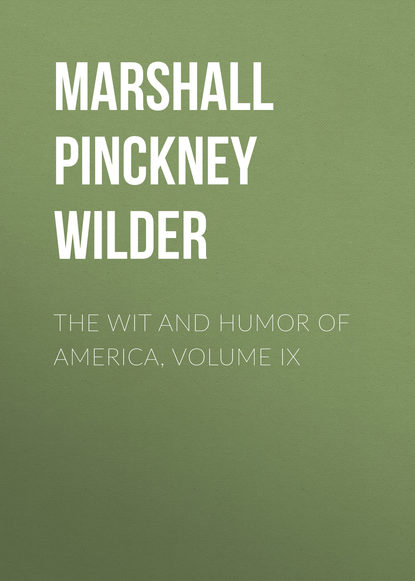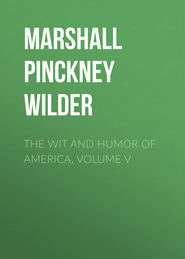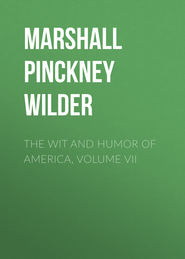По всем вопросам обращайтесь на: info@litportal.ru
(©) 2003-2024.
✖
The Wit and Humor of America, Volume IX
Автор
Год написания книги
2019
Настройки чтения
Размер шрифта
Высота строк
Поля
Here was where Jimaboy's sense of humor came in. He turned on her quickly. She was the picture of righteous indignation trembling to tears. Whereupon he took her in his arms, laughing over her as she might have wept over him.
"Isn't this rich!" he gasped. "We—we built this thing on our specialty, and here we are qualifying like cats and dogs for our great mission to a quarrelsome world. Listen, Bella, dear, and I'll tell you why I weakened. It wasn't curiosity, or just plain, every-day scare. There is sure to be money in some of these letters, and it must be returned. Also, the other people must be told that it was only a joke."
"B-but we've broken our record and qu-quarreled!" she sobbed.
"Never mind," he comforted; "maybe that was necessary, too. Now we can add another course to the curriculum and call it the Exquisite Art of Making Up. Let's get to work on these things and see what we are in for."
They settled down to it in grim determination, cutting out the down-town luncheon and munching crackers and cheese while they opened and read and wrote and returned money and explained and re-explained in deadly and wearisome repetition.
"My land!" said Jimaboy, stretching his arms over his head, when Isobel got up to light the lamps, "isn't the credulity of the race a beautiful thing to contemplate? Let's hope this furore will die down as suddenly as it jumped up. If it doesn't, I'm going to make Hasbrouck furnish us a stenographer and pay the postage."
But it did not die down. For a solid fortnight they did little else than write letters and postal cards to anxious applicants, and by the end of the two weeks Jimaboy was starting up in his bed of nights to rave out the threadbare formula of explanation: "Dear Madam: The ad. you saw in the Sunday Times was not an ad.; it was a joke. There is no Post-Graduate School of W. B. in all the world. Please don't waste your time and ours by writing any more letters."
The first rift in the cloud was due to the good offices of Hasbrouck. He saw matter of public interest in the swollen jest and threw the columns of the Sunday Times open to Jimaboy. Under the racking pressure, the sentimentalist fired volley upon volley of scathing ridicule into the massed ranks of anxious inquirers, and finally came to answering some of the choicest of the letters in print.
"Good!" said Hasbrouck, when the "Jimaboy Column" in the Sunday paper began to be commented on and quoted; and he made Jimaboy an offer that seemed like sudden affluence.
But the crowning triumph came still later, in a letter from the editor of one of the great magazines. Jimaboy got it at the Times office, and some premonition of its contents made him keep it until Isobel could share it.
"We have been watching your career with interest," wrote the great man, "and we are now casting about for some one to take charge of a humorous department to be called 'Bathos and Pathos,' which we shall, in the near future, add to the magazine. May we see more of your work, as well as some of Mrs. Jimaboy's sketches?
"O Jimmy, dear, you found yourself at last!"
But his smile was a grin. "No," said he; "we've just got our diplomas from the Post-Graduate School of W. B.—that's all."
A RULE OF THREE
BY WALLACE RICE
There is a rule to drink, I think,
A rule of three
That you'll agree
With me
Can not be beat
And tends our lives to sweeten:
Drink ere you eat,
And while you eat,
And after you have eaten!
HOW THE MONEY GOES
BY JOHN G. SAXE
How goes the Money?—Well,
I'm sure it isn't hard to tell;
It goes for rent, and water-rates,
For bread and butter, coal and grates,
Hats, caps, and carpets, hoops and hose,—
And that's the way the Money goes!
How goes the Money?—Nay,
Don't everybody know the way?
It goes for bonnets, coats and capes,
Silks, satins, muslins, velvets, crapes,
Shawls, ribbons, furs, and furbelows,—
And that's the way the Money goes!
How goes the Money?—Sure,
I wish the ways were something fewer;
It goes for wages, taxes, debts;
It goes for presents, goes for bets,
For paint, pommade, and eau de rose,—
And that's the way the Money goes!
How goes the Money?—Now,
I've scarce begun to mention how;
It goes for laces, feathers, rings,
Toys, dolls—and other baby-things,
Whips, whistles, candies, bells and bows,—
And that's the way the Money goes!
How goes the Money?—Come,
I know it doesn't go for rum;
It goes for schools and sabbath chimes,
It goes for charity—sometimes;
For missions, and such things as those,—
And that's the way the Money goes!
How goes the Money?—There!
I'm out of patience, I declare;
It goes for plays, and diamond pins,
For public alms, and private sins,
For hollow shams, and silly shows,—
And that's the way the Money goes!
A CAVALIER'S VALENTINE
(1644)
BY CLINTON SCOLLARD
The sky was like a mountain mere,
The lilac buds were brown,
What time a war-worn cavalier
Rode into Taunton-town.
He sighed and shook his head forlorn;
"A sorry lot is mine,"
He said, "who have this merry morn
Pale Want for Valentine."
"Isn't this rich!" he gasped. "We—we built this thing on our specialty, and here we are qualifying like cats and dogs for our great mission to a quarrelsome world. Listen, Bella, dear, and I'll tell you why I weakened. It wasn't curiosity, or just plain, every-day scare. There is sure to be money in some of these letters, and it must be returned. Also, the other people must be told that it was only a joke."
"B-but we've broken our record and qu-quarreled!" she sobbed.
"Never mind," he comforted; "maybe that was necessary, too. Now we can add another course to the curriculum and call it the Exquisite Art of Making Up. Let's get to work on these things and see what we are in for."
They settled down to it in grim determination, cutting out the down-town luncheon and munching crackers and cheese while they opened and read and wrote and returned money and explained and re-explained in deadly and wearisome repetition.
"My land!" said Jimaboy, stretching his arms over his head, when Isobel got up to light the lamps, "isn't the credulity of the race a beautiful thing to contemplate? Let's hope this furore will die down as suddenly as it jumped up. If it doesn't, I'm going to make Hasbrouck furnish us a stenographer and pay the postage."
But it did not die down. For a solid fortnight they did little else than write letters and postal cards to anxious applicants, and by the end of the two weeks Jimaboy was starting up in his bed of nights to rave out the threadbare formula of explanation: "Dear Madam: The ad. you saw in the Sunday Times was not an ad.; it was a joke. There is no Post-Graduate School of W. B. in all the world. Please don't waste your time and ours by writing any more letters."
The first rift in the cloud was due to the good offices of Hasbrouck. He saw matter of public interest in the swollen jest and threw the columns of the Sunday Times open to Jimaboy. Under the racking pressure, the sentimentalist fired volley upon volley of scathing ridicule into the massed ranks of anxious inquirers, and finally came to answering some of the choicest of the letters in print.
"Good!" said Hasbrouck, when the "Jimaboy Column" in the Sunday paper began to be commented on and quoted; and he made Jimaboy an offer that seemed like sudden affluence.
But the crowning triumph came still later, in a letter from the editor of one of the great magazines. Jimaboy got it at the Times office, and some premonition of its contents made him keep it until Isobel could share it.
"We have been watching your career with interest," wrote the great man, "and we are now casting about for some one to take charge of a humorous department to be called 'Bathos and Pathos,' which we shall, in the near future, add to the magazine. May we see more of your work, as well as some of Mrs. Jimaboy's sketches?
"O Jimmy, dear, you found yourself at last!"
But his smile was a grin. "No," said he; "we've just got our diplomas from the Post-Graduate School of W. B.—that's all."
A RULE OF THREE
BY WALLACE RICE
There is a rule to drink, I think,
A rule of three
That you'll agree
With me
Can not be beat
And tends our lives to sweeten:
Drink ere you eat,
And while you eat,
And after you have eaten!
HOW THE MONEY GOES
BY JOHN G. SAXE
How goes the Money?—Well,
I'm sure it isn't hard to tell;
It goes for rent, and water-rates,
For bread and butter, coal and grates,
Hats, caps, and carpets, hoops and hose,—
And that's the way the Money goes!
How goes the Money?—Nay,
Don't everybody know the way?
It goes for bonnets, coats and capes,
Silks, satins, muslins, velvets, crapes,
Shawls, ribbons, furs, and furbelows,—
And that's the way the Money goes!
How goes the Money?—Sure,
I wish the ways were something fewer;
It goes for wages, taxes, debts;
It goes for presents, goes for bets,
For paint, pommade, and eau de rose,—
And that's the way the Money goes!
How goes the Money?—Now,
I've scarce begun to mention how;
It goes for laces, feathers, rings,
Toys, dolls—and other baby-things,
Whips, whistles, candies, bells and bows,—
And that's the way the Money goes!
How goes the Money?—Come,
I know it doesn't go for rum;
It goes for schools and sabbath chimes,
It goes for charity—sometimes;
For missions, and such things as those,—
And that's the way the Money goes!
How goes the Money?—There!
I'm out of patience, I declare;
It goes for plays, and diamond pins,
For public alms, and private sins,
For hollow shams, and silly shows,—
And that's the way the Money goes!
A CAVALIER'S VALENTINE
(1644)
BY CLINTON SCOLLARD
The sky was like a mountain mere,
The lilac buds were brown,
What time a war-worn cavalier
Rode into Taunton-town.
He sighed and shook his head forlorn;
"A sorry lot is mine,"
He said, "who have this merry morn
Pale Want for Valentine."








